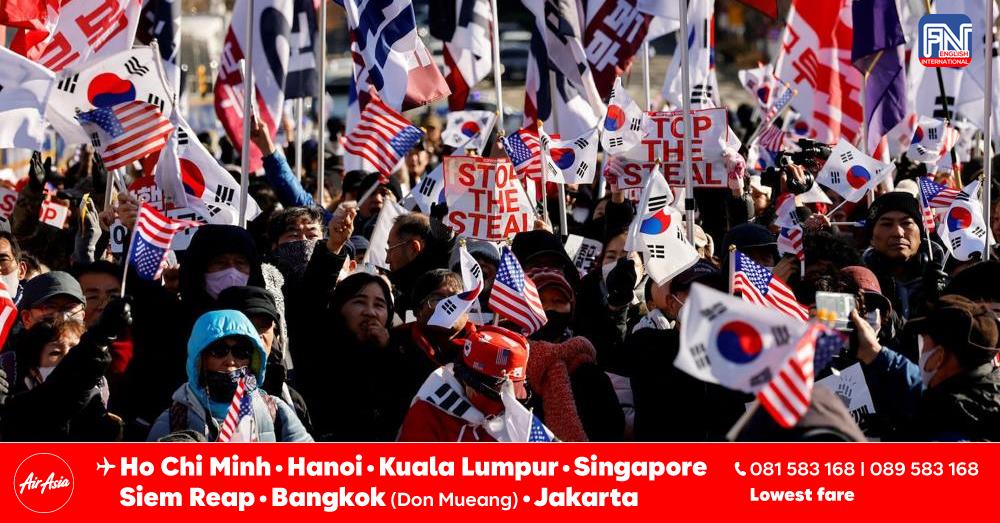SEOUL, Jan 16 (Reuters) - South Korea's arrested President Yoon Suk Yeol failed to attend a second day of questioning by investigators on Thursday, further stonewalling a criminal probe into whether he committed insurrection with his martial law bid.
Yoon on Wednesday became the first sitting South Korean president to be arrested and was taken to the Seoul Detention Centre, after refusing to cooperate. He remained in the centre on Thursday, with his lawyer citing his health as a factor.
Authorities have 48 hours to question the suspended president, after which they must release him or seek a warrant to detain him for up to 20 days.
Yoon's refusal to cooperate with investigators comes as the Constitutional Court held a second hearing in his impeachment trial to determine whether to remove him permanently or reinstate his presidential powers.
South Korea is grappling with its worst political crisis in decades, sparked by Yoon's brief attempt to impose martial law on Dec. 3 that was voted down by parliament.
In opening arguments at the Constitutional Court, an opposition Democratic Party lawmaker condemned Yoon for "the Dec. 3 insurrection" and said Yoon and a small number of supporters had sought to stoke chaos by refusing to accept his arrest warrant.
"This impeachment trial decides whether or not to bring someone like this back to the position of commander-in-chief in control of the military," said Jung Chung-rae, who heads parliament's Legislation and Judiciary Committee.
In response, one of Yoon's defence team said his impeachment was not intended to defend the constitution but for the opposition "to use the majority power of parliament to usurp the position of the president".
The main opposition Democratic Party used its majority in parliament to bring on Yoon's impeachment vote, although some 12 lawmakers from Yoon's own party also voted to impeach.
Opinion polls conducted by Realmeter on Dec. 4, the day after Yoon's martial law declaration, showed 73.6% supported Yoon's impeachment.
Meanwhile, latest opinion polls conducted by Realmeter on Jan. 9-10 showed support for Yoon's ruling party rose to 40.8%, close to the main opposition Democratic Party's 42.2%.
Yoon's lawyer Cho Dae-hyen said the suspended president's decision to declare martial law had been made in good faith based on his view that the country was in a state of emergency.
Another of Yoon's lawyers Bae Jin-han quipped: "Some say 'you get impeached if you breathe' nowadays."
Yoon's arrest on Wednesday ended a weeks-long standoff with authorities after police swooped before dawn on his fortified hillside villa in Seoul to the despair of followers at the site.
Yoon said he turned himself in for questioning by corruption investigation officials to prevent what he called the risk of "unsavoury bloodshed", though he continued to protest that it was an illegal investigation and invalid arrest warrant.
The embattled leader has up to now refused to talk with investigators who had prepared a questionnaire of more than 200 pages, an official from the Corruption Investigation Office for High-ranking Officials (CIO) that is heading the criminal inquiry said.
His questioning had been due to resume at 2 p.m. (0500 GMT) on Thursday, but the CIO said that they had been informed by Yoon's side that he would not attend.
Yonhap cited Yoon Kab-keun, one of Yoon’s lawyers, as saying that the suspended president's health was a factor and saying further questioning was pointless, without elaborating.
A small crowd of protesters supporting Yoon gathered and sat on a road outside the CIO office, calling the president's arrest illegitimate.
His lawyers have said the arrest warrant is illegal because it was issued by a court in the wrong jurisdiction and the team set up to investigate him had no legal mandate to do so.
They have also asked another court to review the legality of the arrest. Yoon's arrest period of 48 hours is temporarily paused while the court review is underway, according to the CIO.
His legal team has denied allegations against Yoon of masterminding insurrection, a crime in South Korea punishable by life imprisonment or even technically by the death penalty.
The last executions in South Korea were in 1997, for criminal offences such as murder.
The political crisis has reverberated across Asia's fourth-largest economy and piled pressure on the won currency.
South Korea's central bank governor said on Thursday that the most important factor determining the health of the economy in coming months was whether the political chaos stabilised.
"That is why a normalisation of the political process is way more important than lowering interest rates a month earlier or later," said Rhee Chang-yong, speaking after the Bank of Korea unexpectedly held policy interest rates steady at 3.00% on Thursday, defying analyst expectations of a cut in rates.

Photo from Reuters




